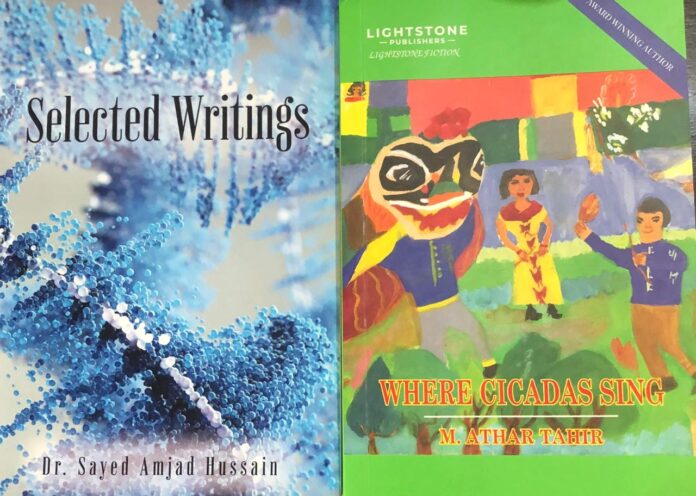Copyright pakistantoday

Some selected prose writings and a neoteric novel By Syed Afsar Sajid ‘Selected Writings’ by Sayed Amjad Hussain ‘Where Cicadas Sing’ by M. Athar Tahir Dr. Sayed Amjad Hussain is a diasporic writer from Peshawar, Pakistan, now living in Toledo (US). He is a prolific author, award-winning photographer, historian, and accomplished cardiovascular surgeon. Thus his career spans medicine, literature, and heritage. M. Athar Tahir is a versatile genius. He writes poetry and fiction in English. His latest publication is a groundbreaking fictional piece titled ‘Where Cicadas Sing’. ‘Selected Writings’ Dedicated to the famed litterateur Ejaz Rahim, this is Dr. Sayed Amjad Hussain’s sixth publication. Apart from the two forewords contributed by this scribe and Ejaz Rahim, the book comprises forty-seven short prose pieces akin to essays, relating to a variety of topics and themes such as memories, reflections, history, antiquity, events, personal experiences, portraits of some common as well as elite figures, travelling, men and matters, occupational landmarks as a meritorious surgeon, social interaction, culture, cuisine et al. Thus it could be considered as a potpourri of views, explications and reminiscences rooted in the author’s existential perceptions, a posteriori judgments, and many an empirical averment. Ejaz Rahim so aptly observes in his introductory remarks that ‘He (Dr. Sayed Amjad Hussain) is a delightful essayist who puts his five senses at the service of the sixth to produce delectable prose pieces that reflect his powers of observation, imagination, interpretation and expression. He mixes wit with wisdom in his literary output in a style that is conspicuously free of affectation or feigned pompousness. He has an uncanny ability to connect with his readership meaningfully as well as pleasingly on social, political, technological, ethical and aesthetic issues. Art and science find a happy comradeship in his peripatetic work.’ The topics of the contents of the book are generally axiomatic, like ‘History adds context, but doesn’t deter critics’, ‘Adversity brings meaning to life and love’, ‘Time doesn’t stand still for homes or for people’, ‘Riding the coronavirus roller-coaster’, ‘Peshawar and the eighth wonder of the ancient world’, ‘Of cultural highways and smashed music records’, ‘De-mystification of the heart’, ‘Trials and tribulations of the upwardly mobile of a different kind’, and ‘Toledo to Toledo’. As an avid story-teller the author creates an imaginative aura about his description of men, matters, places, and happenings. His love for the native soil is evident in pieces titled ‘Khyber Medical College: A reminiscence’, ‘Ongoing rape of my city’, ‘Peshawar: A city of flowers or a back water Timbuktu’, ‘In praise of a good cup of kehva’, ‘In this northwestern hinterland of Pakistan it is springtime’, and ‘Finding Nirvana in Nathiagali’. The book thus, is an interesting read likely to please readers with a taste for history, geography, culture, aesthetics, and medico-surgical pursuits of sorts. ‘Where Cicadas Sing’ Athar Tahir is an acclaimed Pakistani poet of English, author, and painter. A former bureaucrat, he was also a Rhodes Scholar for Pakistan at Oxford University. His books on art, culture and literature have won many national and international awards including the coveted Patras Bokhari Award (for four times). He is also a recipient of Tamgha-i-Imtiaz and Sitara-i-Imtiaz, an elected Fellow of the Royal Asiatic Society of Great Britain and a Fellow of Pakistan Academy of Letters besides being the founder of the International Centre for Pakistani Writing in English (ICPWE) at the Kinnaird College. Lahore. ‘Where Cicadas Sing’, his latest publication, is a semi-biographical novel, narrating the life journey of its adolescent protagonist, empathetically the author himself, starting from his native country Pakistan transiting to Malaysia whose landscape and culture are depicted vividly within the framework of a romantic title seeking to symbolize the intersection of nature, culture and human experience. ‘Cicada’ is a Latin word denoting ‘tree cricket’ which does not bite, sting, or carry diseases. In some Asian countries, cicadas are a symbol of re-birth, health, wealth and happiness. In the instant novel cicadas represent the protagonist’s longing for connection and sense of belonging; their singing serves as a reminder of the harmony between nature and human life. In a way they are emblematic of the protagonist’s cultural roots, connecting them to their Pakistani and Malaysian heritage. In his blurb for the book, this scribe earlier observed that ‘The surface naivety of the narrative technique is in effect a smokescreen that simulates its intent artistic ambience converging on filial bonding, adolescent yearnings, a frantic pursuit of academics and love as a non-ephemeral sensation spasmodically stirring emotions’. Veteran scholar Dr. Waseem Anwar views the novel, comprising some 143 chapters, as a ‘mesmerising narrative of a pre-teen youngster who gradually, uncovers a world both of innocence and experience’. He further remarks that ‘heterogeneous ideas are yoked by the growing vocabulary, abstract concepts such as being, knowing, identity, time, and space manifest in the criss-crossing, cosmopolitan, personae and milieu’. Commenting on the novel, noted fiction writer Faryal Ali Gauhar says that ‘innocence is peeled back layer by layer, like the opening of a durian, its skin spiky and foreboding, its flesh sweet and creamy’. In Part A of the novel, the young narrator reflects on his family’s movement touching on themes of identity and belonging. The family encounters cicadas, symbolizing the connection between nature and human experience. In Part B, the narrator explores his surroundings, observing the local culture and people, showing the beauty of diversity. In Part C, harmony between nature and human life is highlighted through a contrast between the latter’s naturalistic façade and singing of cicadas. A young boy Ananda tries to impress the narrator with his knowledge showcasing the innocence and curiosity of childhood. Interaction of the narrator with Ananda serves to project the themes of friendship, cultural exchange, and the beauty of human connection. Finally in Part D, the narrator reflects on the family’s return from Malaysia, with cicadae humming at a remote distance, hinting at the sweet-sour nature of farewells. In a way the book looks like a quintessential adaptation of Thomas Carlyle’s famous quote ‘Reality, if rightly interpreted, is grander than fiction’ which stipulates that by truly understanding and interpreting the world around us, we can see that its actual events, people, and phenomena are far more credible than any story a writer could invent because the true complexities and wonder of reality surpass what is typically depicted in fiction.



